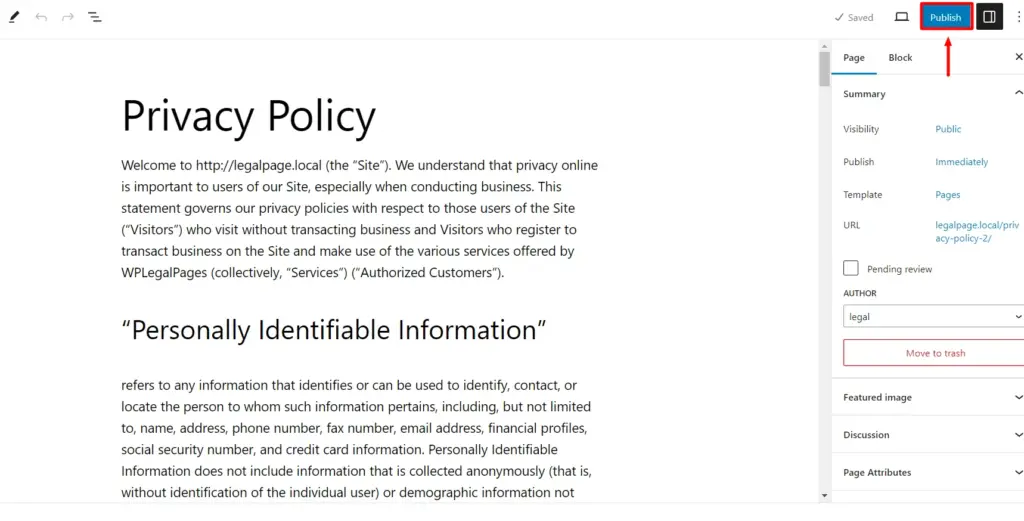How To Create Privacy Policy For Real Estate Website

Are you wondering about how to create a privacy policy for real estate website?
Wonder no more! This article has got you covered.
In this modern world, establishing trust with your customers is of paramount importance.
The real estate industry is no exception. With tons of sensitive data being collected and stored on real estate websites, it’s crucial for real estate websites to have a privacy policy. This not only helps you comply with global laws but also gives your visitors a sense of security.
This article will guide you through various aspects of privacy policy for real estate website and help you create one for your own.
So let’s get started!
Does Your Real Estate Website Need a Privacy Policy?
If your website collects users’ personal information, like their names, email addresses, or other sensitive data, via any means, then “yes,” your website must have a privacy policy.
This is more than just ensuring legal compliance. A well-drafted privacy policy promotes openness by informing visitors that you value their privacy and are committed to protecting their information.
But why is it essential, especially in the real estate sector?
The reasons are as follows:
- Legal Compliance: Data privacy protection laws such as General Data Protection Regulation (GDPR), California Consumer Privacy Act (CCPA), and others ensure consumers’ data safety. These laws prevail that a website collecting personal data of visitors must issue a privacy policy statement, failure to comply with the same can lead to hefty fines and legal consequences.
- Builds Trust: Real estate dealings and transactions often involve the exchange of sensitive and crucial information or financial details. A well-drafted privacy policy outlines the technicalities of the data collected, including information about its collection, usage, sharing, tracking, and security measures. This information helps customers rely and trust on your website and also ensures their data safety.
- Improves Reputation: The inclusion of a privacy policy for real estate websites helps build a positive image for your business. Alongside, it also minimizes the risk of data breaches and other privacy-related issues, which likely increases consumer engagement with your website.
- Ensures Internal Compliance: A privacy policy benefits your customers and serves as a structure for internal operations. By specifying how data should be gathered, kept, and used, you can develop a consistent approach throughout your organization. This consistency ensures that every member of your team understands their responsibility in securing customer data.
What to Include in Your Real Estate Website Privacy Policy
Now that you know why you must create a privacy policy page for your website, it’s crucial to understand what to include. A privacy policy for your real estate website must include many components to ensure transparency and compliance with data protection laws. Here are some key aspects to consider:
1. Introduction
The Introduction section is a key element you must include in your website’s privacy policy.
This section should include your business name, to whom the policy addresses and relevant terminologies included in the policy.
You can also include a table of contents in the introduction section for easy user navigation.
2. Data Collection
Your website’s privacy policy statement should explain the types of personal information it obtains from visitors, including:
- Personal Information: Name, email address, phone number, mailing address, and other contact details.
- Financial Information: If applicable, such as mortgage details or payment information.
- Behavioral Data: How users interact with your website, including clicks, page views, and browsing history.
- Device Information: IP addresses, browser type, operating system, and other technical data.
3. Data Usage
The privacy policy statement must specify how the collected data will be utilized. This can include data usage for:
- Providing Services: To offer real estate listings, respond to inquiries, or complete transactions.
- Communication: To send updates, newsletters, or marketing emails (with an option to opt out).
- Improving Services: To enhance website functionality, customer experience, and marketing efforts.
- Compliance: To comply with legal requirements or industry standards.
4. Data Sharing
The privacy policy should disclose whether you share user information with any third parties or not. This can include sharing your details with:
- Business Partners: Other real estate agents, brokers, or property management companies.
- Service Providers: Companies that support your business operations, like hosting services or email marketing platforms.
5. Cookies and Tracking
The privacy policy statement must inform the user about the use of cookies, web beacons, and other tracking technologies. It should explain their purpose, such as improving website functionality, analyzing user behavior, or delivering targeted advertisements. It should also provide instructions on how users can manage their cookie preferences, including opting out of non-essential cookies.
6. Security Measures
The privacy policy must detail the security measures and protocols in place to safeguard user data from unauthorized access, misuse, or breaches. These may include encryption, secure data storage, access controls, regular security audits, and compliance with industry standards.
7. User Rights
The privacy policy should inform users of their rights regarding their personal data, including the rights of:
- Access and Correction: The users have the right to access and correct their data.
- Deletion and Opt-Out: The users have the right to request deletion or opt-out of certain communications.
- Data Portability: Users can request a copy of their data to be stored on the website.
How to Create a Privacy Policy for Real Estate Website

The easiest way to create a privacy policy for a real estate website is by using a privacy policy generator. Privacy policy generators are easy-to-use plugins that guide you through the process of generating a customized privacy policy template for your website.
There are various free privacy policy generators available. However, we recommend you to use the WP Legal Pages, an easy-to-use free privacy policy Generator that makes creating a website privacy policy easier for you. It is not only easy to use but also offers intuitive wizard support that helps you create a privacy policy template from start to finish.
All you need to do is download the plugin and sign up; further, the wizard will guide you with questionnaire that will help you tailor a custom privacy policy page for your real estate website.
Moreover, it also allows you to create policy templates in various languages, including English, French, German, Portuguese, Italian, and more.
Steps To Create A Privacy Policy For Your Website
To generate a privacy policy for your real estate website, follow the following steps:
1. Installing The WP Legal Pages Plugin
Navigate over your WordPress Dashboard and click on Plugins > Add New.

Search for WPLegalPages in the search bar.

Click on the Install Now Button.

Click on the Activate button and activate the plugin.

Once the plugin is active, you can directly access it from your WordPress Dashboard.

2. Creating a Privacy Policy For Your Real Estate Website
From your Dashboard, click WPLegalPages and click Accept to create your legal pages.

To create a Privacy Policy for your website, click Create Legal Page from the WP Legal Pages menu.

You will now be able to see four templates available in the free version. Click on the Standard Privacy Policy option to create a Privacy policy for real estate website.

Fill in the Basic Details and click Next.

Select the appropriate section for your legal policy, then click Next.

Your Privacy Policy Template Preview is ready.

3. Customize your Privacy Policy
Click on the Create and Edit option to edit or add any additional information to your privacy policy.

After you have made the necessary changes, click on Publish.

There you go with a customized privacy policy template tailored for your real estate website.
Global Privacy Laws Affecting Real Estate Websites
As concerns about data privacy and security continue to threaten, several global privacy laws have been enacted to protect individuals’ privacy policy rights.
These laws implies on businesses based on their size, the type of data they collect, and their geographic presence.
These laws include:
1. General Data Protection Regulation (GDPR)
The General Data Protection Regulation (GDPR), enforced by the European Union (EU), is one of the world’s most comprehensive data privacy rules. It applies to any organization that handles personal data for individuals residing in the EU, regardless of location.
Real estate websites that seek or gather data from EU residents must adhere to GDPR, failing which might result in hefty fines and legal repercussions.
2. California Consumer Privacy Act (CCPA)
The California Consumer Privacy Act (CCPA) gives Californian residents significant rights over personal information stored by businesses. While it only applies to enterprises that operate in California or handle data from the citizens of California, its economic impact is enormous.
Real estate websites that handle data from California residents must follow the CCPA’s rules, including providing notice of data collection methods, opt-out procedures, and not selling personal information without consent.
3. Personal Information Protection and Electronic Documents Act (PIPEDA)
PIPEDA is Canada’s federal privacy law that governs the acquisition, use, and disclosure of personal information. Although it applies to organizations based in Canada, its extraterritorial jurisdiction may include real estate websites that handle Canadian residents’ information.
It involves getting individuals’ consent for data processing, disclosing the purpose of data collection, protecting personal information, and granting access to individuals’ own data.
4. Other Local Regulations
In addition to these key worldwide privacy laws, many countries have established their own data protection regulations. For instance, the Personal Data Protection Act (PDPA) in Singapore, the Personal Data Protection Law (PDPL) in Brazil, and the Personal Information Protection Law (PIPL) in China are examples of such regulations.
To avoid legal implications, real estate websites that target visitors in these countries must follow their respective privacy regulations.
Where Should You Display Your Real Estate Website’s Privacy Policy?
Your real estate website’s privacy policy should be prominently displayed and easily accessible on your website.
Typically, it is a good idea to provide a link to your privacy policy at the footer of your website so that it displays on every page. This ensures visitors can simply find and access the privacy policy anywhere on your website.
In addition, you should also consider posting a link to the privacy policy on any forms that collect personal information, such as contact forms or registration sites. This helps to ensure that visitors are aware of your privacy policies when they submit information.
FAQ
In your real estate privacy policy, you should include information about the types of personal data you collect from visitors, how you use that data, who you share it with, how you protect it, and the rights of your visitors regarding their personal information. You should also outline the use of cookies and other tracking technologies on your website and provide contact information for privacy-related inquiries.
You can create a real estate privacy policy for free by using online privacy policy generators specifically tailored to real estate websites. We recommend using the WP Legal Pages plugin. It is an easy-to-use free privacy policy generator that helps you instantly create a custom privacy policy template tailored for your business.
Yes, you need a privacy policy on your real estate website. A privacy policy is essential for informing visitors about how you collect, use, and protect their personal information. It also helps to establish trust and demonstrates your commitment to privacy and data protection.
To create a privacy policy for your website in the USA, you can use WP Legal Pages’ privacy policy generators. It is designed to comply with US privacy laws, such as the California Consumer Privacy Act (CCPA) and the General Data Protection Regulation (GDPR).
Conclusion
Creating a privacy policy on your website not only helps you comply with regulations but also fosters trust and credibility with your audience.
This comprehensive guide has covered all the essentials you need to know to create a privacy policy for your real estate website.
If you liked this article, you can also consider reading:
- Best Privacy Policy Generators For Your Website
- How To Add Privacy Policy In WordPress | The Complete Guide
- What is Global Privacy Control (GPC) – A Beginner’s Guide
Thinking of making a privacy policy for your website? Grab the WP Legal Pages plugin now!

Leave a Reply